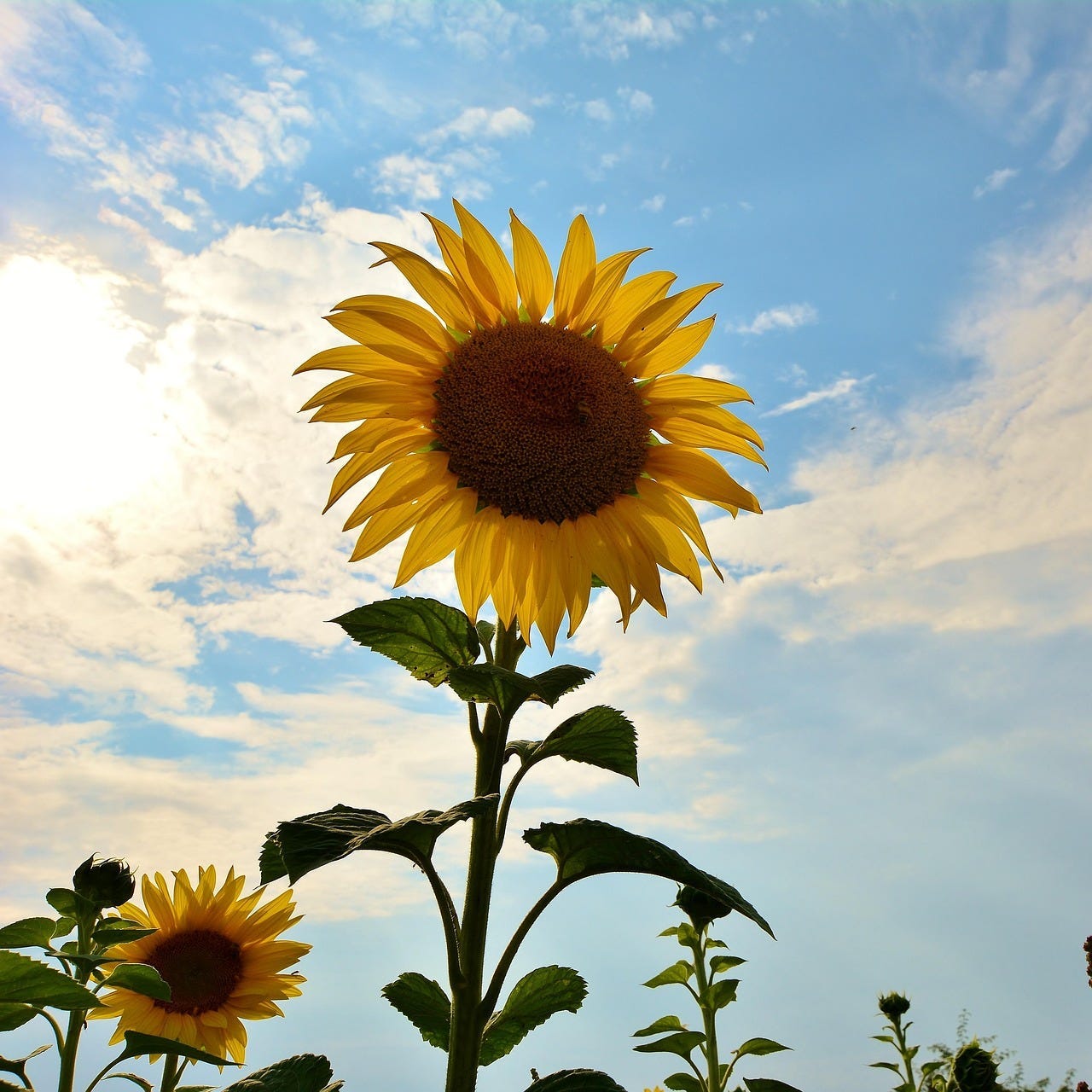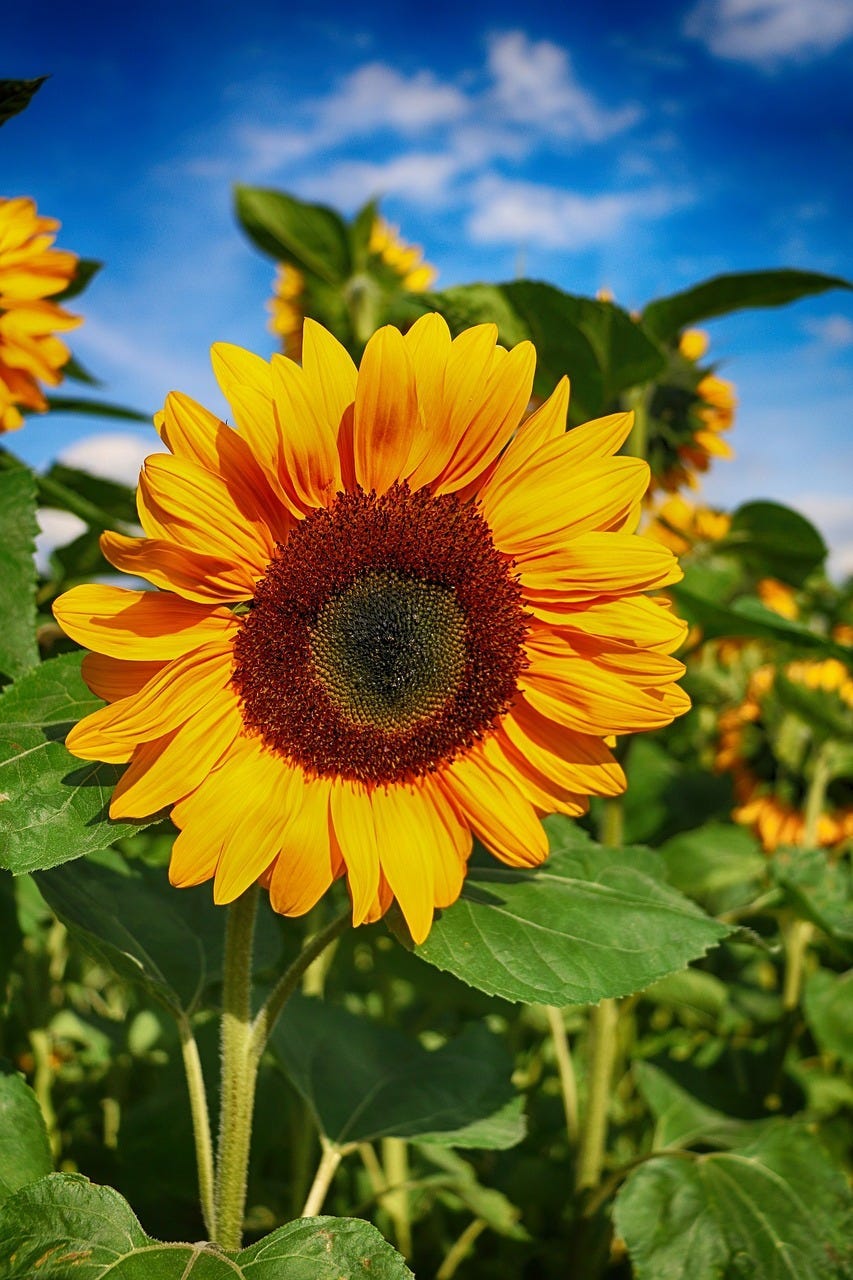Sunflower #1: "Recommendation" a poem by Thich Nhat Hanh
"Man is not the enemy. Our enemy is hatred, anger, ignorance and fear."
“Sunflower” posts are to share inspiration about activism. They are to explore our ideals, passions, and motivations.
Like a young sunflower, it is helpful to orient ourselves towards the sun, letting it guide us during hard times of growth. So that when we are grown, we can face proudly east together, to greet the sunrise we know awaits us in the morning. See all Sunflower posts here.
Recommendation, a poem by Thich Nhat Hanh
Promise me,
promise me this day,
promise me now,
while the sun is overhead
exactly at the zenith,
promise me:
Even as they
strike you down
with a mountain of hatred and violence;
even as they step on you and crush you
like a worm,
even as they dismember and disembowel you,
remember brother, remember:
man is not our enemy.
The only thing worthy of you is compassion –
invincible, limitless, unconditional.
Hatred will never let you face
the beast in man.
One day, when you face this beast alone
with your courage intact, your eyes kind,
untroubled
(even as no one sees them),
out of your smile
will bloom a flower.
And those who love you
will behold you
across ten thousand worlds of birth and dying.
Alone again,
I will go on with bent head,
knowing that love has become eternal.
On the long, rough road
the sun and moon will continue to shine.
Additionally, here is a heartfelt reading of this poem by Sister Chan Khong, the Elder nun of Plum Village, released about 2 years after Thich Nhat Hanh’s death.
I encourage reading his full explanation of the conditions and reasons for writing this poem in 1965 during his peace work in Vietnam.
Lately, I have been drawn to this poem, I think it is because it has been harder to hold on to compassion as a guiding light. There has been so much happening to stir the anger inside of me. Seeing this in myself makes it easier for me to see how, as a conflict worsens, people can begin to use hate and violence to fuel their actions.
So I ask myself, how and why will I hold on to compassion and understanding as things progress?
I find it powerful, imagining Thich Nhat Hanh writing this poem in the midst of the violent Vietnam War. Knowing that he wrote this poem for the young people working for the School of Youth for Social Service, some of whom had already been violently killed.
These young people were going into rural areas to establish schools, build healthcare clinics, and help rebuild villages, knowing that their work could be destroyed and that their lives were at risk. They were organizing under conditions difficult for those of us who have not experienced war directly to understand. However, they were still able to have around 10,000 students at its peak, working for peace and to reduce the suffering of the people most directly impacted by the war.
Perhaps Thich Nhat Hanh’s insight was that hate, anger, and fear could not sustain long-term activism that has the goal to end hate, anger, and fear. He says something similar to this in his book “Peace is Every Step” in a section called “Waging Peace”:
“Many people are aware of the world’s suffering; their hearts are filled with compassion. They know what needs to be done, and they engage in political, social, and environmental work to try to change things. But after a period of intense involvement, they may become discouraged if they lack the strength needed to sustain a life of action. Real strength is not in power, money, or weapons, but in deep, inner peace.”
- Thich Nhat Hanh
So to do this work, we may even need to forgive the person who may kill us, to have the inner compassion and peace to live a life of engaged activism. To touch the source within that is “invincible, limitless, unconditional.”
Perhaps it is also the idea that we cannot stop hate, anger, ignorance, and fear with more of the same. That we cannot follow a path of violence and hatred and somehow end up with a society of peace and love. Like as stated by A.J. Muste, a Christian pacifist and social activist, in this quote:
“There is no way to peace; peace is the way.” -A.J. Muste
Furthermore, if we look back to other resistance movements, we see that nonviolence is often a successful strategy. According to research from Erica Chenoweth at the International Center of Nonviolent Conflict from 1900-2006, she found that “campaigns of nonviolent civil resistance were twice as successful as violent campaigns”. They also found evidence to suggest that even just 3.5% of a population actively engaging in nonviolent resistance can significantly influence any government. Chenoweth highlights many reasons this might be the case; nonviolent campaigns can gain larger and broader public support. It is easier to discuss nonviolent action publicly, it allows the movement to operate from the “moral high ground”, and it is more likely to win the support of members of the police and military — reducing their willingness to crack down on the movement.

Using nonviolent resistance, we can better win hearts, change minds, and reduce the wrong perceptions that separate us. It lets us work to transform what we truly oppose, whereas violence doesn’t end a person's ideas, just their life. Violence or death has ended the lives of many leaders of peace, like Martin Luther King Jr., but their ideas and legacies survived. Similarly, hateful ideas did not disappear when their proponents were killed, and we still work to transform these beliefs to this day.
Perhaps this is what is meant by the line “Alone again, I will go on with bent head, knowing that love has become eternal,” that if we hold to our compassion and understanding, not even death can take it away from us.
We can also see this call for using “light” to drive out “darkness” from the writing of Martin Luther King Jr in his 1963 book “Strength to Love”:
“Returning hate for hate multiplies hate, adding deeper darkness to a night already devoid of stars. Darkness cannot drive out darkness; only light can do that. Hate cannot drive out hate; only love can do that. Hate multiplies hate, violence multiplies violence, and toughness multiplies toughness in a descending spiral of destruction. So when Jesus says “Love your enemies,” he is setting forth a profound and ultimately inescapable admonition. Have we not come to such an impasse in the modern world that we must love our enemies—or else? The chain reaction of evil—hate begetting hate, wars producing more wars—must be broken, or we shall be plunged into the dark abyss of annihilation.”
- Martin Luther King, Jr.
So during these hard times, I look to the example of the students of the School of Youth for Social Service. They were doing the work of peace while risking their lives — they were doing the work of ending hatred, anger, ignorance, and fear.
I hope we all can find how to touch an “invincible, limitless, unconditional” source of compassion within ourselves, and that it inspires us to take action even when it is difficult to do so.
I will leave you with one more beautiful rendition of this poem from the Benedictine monks of Weston Priory:
Thank you for being here,
Chris






